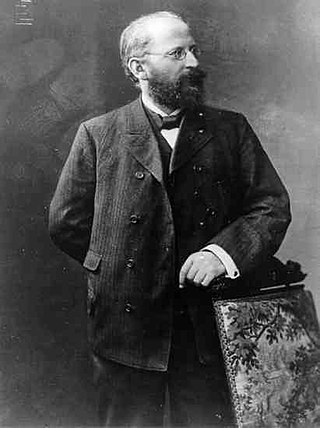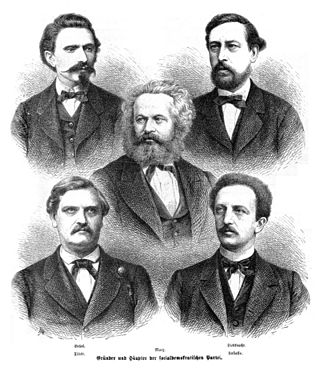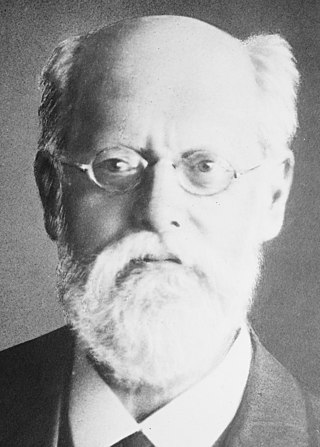
The Social Democratic Party of Germany is a centre-left social democratic political party in Germany. It is one of the major parties of contemporary Germany.

Eduard Bernstein was a German social democratic Marxist theorist and politician. A member of the Social Democratic Party of Germany (SPD), Bernstein had held close association to Karl Marx and Friedrich Engels, but he began to identify what he believed to be errors in Marxist thinking and began to criticize views held by Marxism when he investigated and challenged the Marxist materialist theory of history. He rejected significant parts of Marxist theory that were based upon Hegelian metaphysics and rejected the Hegelian perspective of an immanent economic necessity to socialism.
Social Reform or Revolution? is an 1899 pamphlet by Polish-German Marxist theorist Rosa Luxemburg. Luxemburg argues that trade unions, reformist political parties and the expansion of social democracy—while important to the proletariat's development of class consciousness—cannot create a socialist society as Eduard Bernstein, among others, argued. Instead, she argues from a historical materialist perspective that capitalism is economically unsustainable and will eventually collapse and that a revolution is necessary to transform capitalism into socialism. The pamphlet was heavily influential in revolutionary socialist circles and along with Luxemburg's other work an important precursor to left communist theory.
Social democracy is a political, social, and economic philosophy within socialism that supports political and economic democracy. As a policy regime, it is described by academics as advocating economic and social interventions to promote social justice within the framework of a liberal-democratic polity and a capitalist-oriented mixed economy. The protocols and norms used to accomplish this involve a commitment to representative and participatory democracy, measures for income redistribution, regulation of the economy in the general interest, and social welfare provisions. Due to longstanding governance by social democratic parties during the post-war consensus and their influence on socioeconomic policy in Northern and Western Europe, social democracy became associated with Keynesianism, the Nordic model, the social-liberal paradigm, and welfare states within political circles in the late 20th century. It has been described as the most common form of Western or modern socialism, as well as the reformist wing of democratic socialism.

The foundation of the Social Democratic Party of Germany can be traced back to the 1860s, and it has represented the centre-left in German politics for much of the 20th and 21st centuries. From 1891 to 1959, the SPD theoretically espoused Marxism.
Democratic socialism is a left-wing political philosophy that supports political democracy and some form of a socially owned economy, with a particular emphasis on economic democracy, workplace democracy, and workers' self-management within a market socialist economy or an alternative form of a decentralised planned socialist economy. Democratic socialists argue that capitalism is inherently incompatible with the values of freedom, equality, and solidarity and that these ideals can only be achieved through the realisation of a socialist society. Although most democratic socialists seek a gradual transition to socialism, democratic socialism can support revolutionary or reformist politics to establish socialism. Democratic socialism was popularised by socialists who opposed the backsliding towards a one-party state in the Soviet Union and other nations during the 20th century.

Revisionism represents various ideas, principles, and theories that are based on a revision of Marxism. According to their critics, this involve a significant revision of fundamental Marxist theories and premises, and usually involve making an alliance with the bourgeois class. Academics have used revisionism to describe post-Stalin, Eastern European writers who criticized one-party rule and argued in favour of freedom of the press and of the arts, intra- and sometimes inter-party democracy, independent labor unions, the abolition of bureaucratic privileges, and the subordination of police to the judiciary.
State socialism is a political and economic ideology within the socialist movement that advocates state ownership of the means of production. This is intended either as a temporary measure, or as a characteristic of socialism in the transition from the capitalist to the socialist mode of production or to a communist society. State socialism was first theorised by Ferdinand Lassalle. It advocates a planned economy controlled by the state in which all industries and natural resources are state-owned.
Centre-left politics lean to the left on the left–right political spectrum but are closer to the centre than other left-wing politics. Those on the centre-left believe in working within the established systems to improve social justice. The centre-left promotes a degree of social equality that it believes is achievable through promoting equal opportunity.
Liberal socialism is a political philosophy that incorporates liberal principles to socialism. This synthesis sees liberalism as the political theory that takes the inner freedom of the human spirit as a given and adopts liberty as the goal, means and rule of shared human life. Socialism is seen as the method to realize this recognition of liberty through political and economic autonomy and emancipation from the grip of pressing material necessity. Liberal socialism refuses to abolish capitalism with a socialist economy and supports a mixed economy that includes both social ownership and private property in capital goods.
Revolutionary socialism is a political philosophy, doctrine, and tradition within socialism that stresses the idea that a social revolution is necessary to bring about structural changes in society. More specifically, it is the view that revolution is a necessary precondition for transitioning from a capitalist to a socialist mode of production. Revolution is not necessarily defined as a violent insurrection; it is defined as a seizure of political power by mass movements of the working class so that the state is directly controlled or abolished by the working class as opposed to the capitalist class and its interests.

Orthodox Marxism is the body of Marxist thought that emerged after the death of Karl Marx (1818–1883) and which became the official philosophy of the majority of the socialist movement as represented in the Second International until the First World War in 1914. Orthodox Marxism aims to simplify, codify and systematize Marxist method and theory by clarifying the perceived ambiguities and contradictions of classical Marxism.
Ethical socialism is a political philosophy that appeals to socialism on ethical and moral grounds as opposed to consumeristic, economic, and egoistic grounds. It emphasizes the need for a morally conscious economy based upon the principles of altruism, cooperation, and social justice while opposing possessive individualism.
Reformism is a political doctrine advocating the reform of an existing system or institution instead of its abolition and replacement.
A socialist state, socialist republic, or socialist country, sometimes referred to as a workers' state or workers' republic, is a sovereign state constitutionally dedicated to the establishment of socialism. The term communist state is often used synonymously in the West, specifically when referring to one-party socialist states governed by Marxist–Leninist communist parties, despite these countries being officially socialist states in the process of building socialism and progressing toward a communist society. These countries never describe themselves as communist nor as having implemented a communist society. Additionally, a number of countries that are multi-party capitalist states make references to socialism in their constitutions, in most cases alluding to the building of a socialist society, naming socialism, claiming to be a socialist state, or including the term people's republic or socialist republic in their country's full name, although this does not necessarily reflect the structure and development paths of these countries' political and economic systems. Currently, these countries include Algeria, Bangladesh, Guyana, India, Nepal, Nicaragua, Sri Lanka and Tanzania.

Karl Johann Kautsky was a Czech-Austrian philosopher, journalist, and Marxist theorist. Kautsky was one of the most authoritative promulgators of orthodox Marxism after the death of Friedrich Engels in 1895 until the outbreak of World War I in 1914.
The history of socialism has its origins in the Age of Enlightenment and the 1789 French Revolution along with the changes that it brought, although it has precedents in earlier movements and ideas. The Communist Manifesto was written by Karl Marx and Friedrich Engels in 1847-48 just before the Revolutions of 1848 swept Europe, expressing what they termed scientific socialism. In the last third of the 19th century parties dedicated to Democratic socialism arose in Europe, drawing mainly from Marxism. The Australian Labor Party was the world's first elected socialist party when it formed government in the Colony of Queensland for a week in 1899.
Crisis of Marxism was a term first employed in the 1890s after the unexpected revival of global capitalist expansion became evident after the Great Depression of Europe from 1873-1896, which eventually precipitated a crisis in Marxist theory. The crisis resulted in a series of theoretical debates over the significance of economic recovery for the strategy of the socialist movement, leading to ideological fragmentation and increasingly sectarian debates. By the 1890s, orthodox Marxists came to believe that capitalism was on the “verge of breakdown,” while the socialist movement was on the “verge of revolutionary triumph,” but due to a renewed burst of capitalist and industrial activity such interpretations could no longer be maintained in Western Europe.
Social democracy originated as an ideology within the labour whose goals have been a social revolution to move away from purely laissez-faire capitalism to a social capitalism model sometimes called a social market economy. In a nonviolent revolution as in the case of evolutionary socialism, or the establishment and support of a welfare state. Its origins lie in the 1860s as a revolutionary socialism associated with orthodox Marxism. Starting in the 1890s, there was a dispute between committed revolutionary social democrats such as Rosa Luxemburg and reformist social democrats. The latter sided with Marxist revisionists such as Eduard Bernstein, who supported a more gradual approach grounded in liberal democracy and cross-class cooperation. Karl Kautsky represented a centrist position. By the 1920s, social democracy became the dominant political tendency, along with communism, within the international socialist movement, representing a form of democratic socialism with the aim of achieving socialism peacefully. By the 1910s, social democracy had spread worldwide and transitioned towards advocating an evolutionary change from capitalism to socialism using established political processes such as the parliament. In the late 1910s, socialist parties committed to revolutionary socialism renamed themselves as communist parties, causing a split in the socialist movement between these supporting the October Revolution and those opposing it. Social democrats who were opposed to the Bolsheviks later renamed themselves as democratic socialists in order to highlight their differences from communists and later in the 1920s from Marxist–Leninists, disagreeing with the latter on topics such as their opposition to liberal democracy whilst sharing common ideological roots.





